J.K. Rowling has done much to revive the literary genre of boarding school stories, which achieved its greatest (pre-Potter) popularity in the period between Tom Brown’s Schooldays (1857) and the mid-twentieth century. As a setting, boarding schools allow for the construction of thrilling narratives: concerned parents are replaced by teachers who may well prioritize student achievement over student welfare, e.g. maximizing points for Gryffindor over the survival of the students earning those points. Because the students cannot easily walk away from the school, they must deal with teachers and other students, some of whom may be vividly villainous (Miss Minchin, for example—the antagonist in Frances Hodgson Burnett’s A Little Princess).
Are there any SFF novels featuring boarding schools? Why yes! I am glad you asked—there are more than I can list in a single article. Here are just a few.
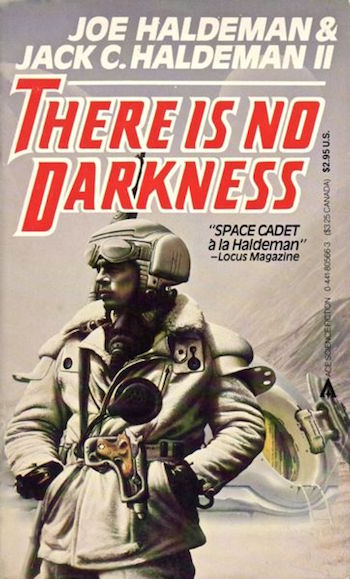
Joe and Jack C. Haldeman’s 1983 fix-up There is No Darkness features an institution called Starschool. It is both school and starship; its itinerary includes a dozen-plus worlds scattered across the Confederación. Each world offers opportunities for students to find themselves in way over their heads. Protagonist Carl Bok, who hails from a backwater planet, must prove himself to his wealthier and more cultured schoolmates. He strides confidently into danger and then must do his best to extricate himself.
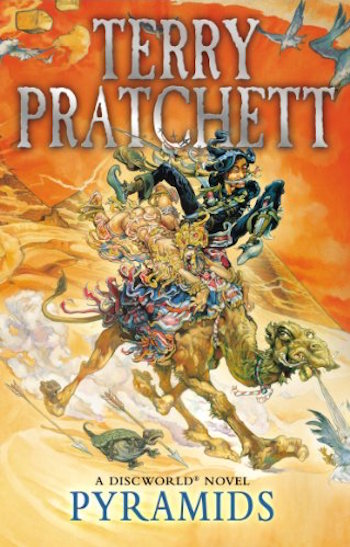
Terry Pratchett’s Pyramids (1989) introduces Ankh-Morpork’s Assassin’s Guild…or to be more exact, the institution that trains the assassins of tomorrow. Entry into the school is easy, whether one is poor or, like Pteppic of Djelibeybi, of actual nobility. Between induction and graduation, students receive an education in all the ways that living beings can be ushered into the afterlife. One in fifteen of the students emerges having mastered these techniques. The other fourteen gain personal acquaintance with sudden murder. Still, everyone agrees that the Assassin’s Guild is a lot more fun than the Jester’s Guild next door. Pteppic of Djelibeybi may survive the school—only to find that it’s actually less frightening than the looming danger waiting for him at home.
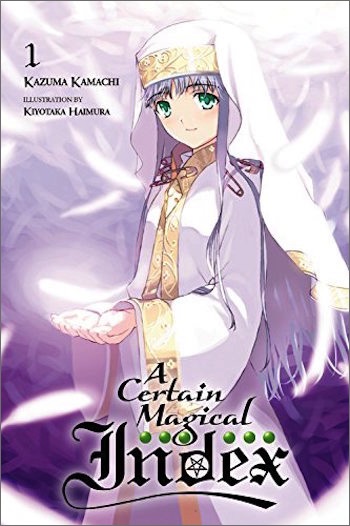
Kazuma Kamachi’s ongoing series of short novels and their associated manga and anime (A Certain Magical Index, A Certain Scientific Railgun, A Certain Scientific Accelerator, etc.) is set in Academy City. The city is home to over two million students, most of whom have some degree of reality-breaking Esper power. Some can control electromagnetism; some can keep objects at a constant temperature. Imagine the Xavier School for the Gifted with the population of Paris, France. Unlike the leadership of Xavier’s school, however, the people running Academy City are ambitious people entirely unfamiliar with the concepts of consent or ethics….
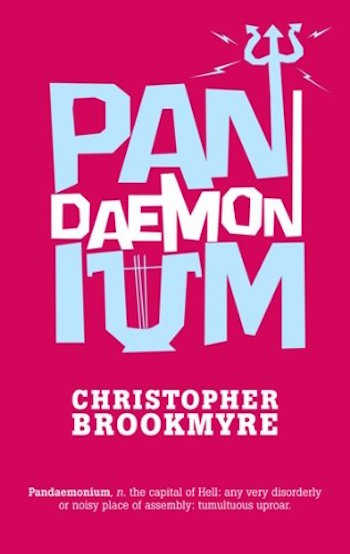
Christopher Brookmyre’s 2009 Pandaemonium features St. Peter’s High School. It isn’t technically a boarding school, but it ventures into boarding school territory when administrators arrange a retreat for students in a secluded facility. The teachers and staff have only the best of intentions: the outing is an effort to ensure that the students come to terms with the recent death of a schoolmate. Alas, the staff have not vetted the facility’s neighbours as well as they should have, which is why it takes the attendees some time to become aware that they will be dossing down next to a portal to Hell. Coming to terms with death swiftly becomes a universal experience.
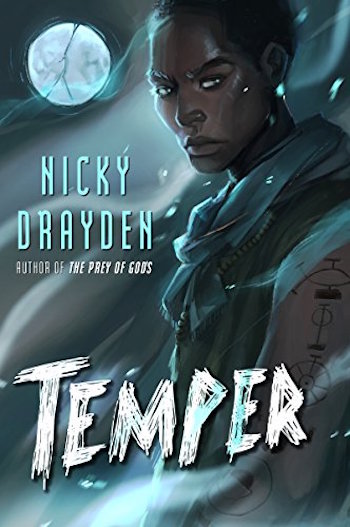
Most denizens of boarding schools are dispatched there by their parents or guardians. In Nicky Drayden’s 2018 Temper, twin brothers Auben and Kasim have connived to win their way into a prestigious boarding school; they’ve blackmailed their wealthy father (whose paternity is unacknowledged; he prefers that it stay that way). The twins enroll in the hope that somewhere in the school’s well-stocked library is a hint about how to cure the brothers’ ongoing divine possession. It’s good to have goals when one heads off to higher education; the twins manage to achieve unimagined heights. Of what, I’m not telling you…
So, if you are a writer and your youthful protagonists are burdened with parents as doting as they are competent1 , don’t despair! Simply invent a suitably Dickensian educational establishment that offers full-time living quarters and dispatch them hence. Adventure can only follow!
Originally published in January 2019.
In the words of Wikipedia editor TexasAndroid, prolific book reviewer and perennial Darwin Award nominee James Davis Nicoll is of “questionable notability.” His work has appeared in Publishers Weekly and Romantic Times as well as on his own websites, James Nicoll Reviews and Young People Read Old SFF (where he is assisted by editor Karen Lofstrom and web person Adrienne L. Travis). He is surprisingly flammable.
[1]There is another solution, which I have encountered in the works of authors from Heinlein to Jones, which is to provide the protagonists with parents and other guardians who are distracted, indifferent, or cheerfully obstructive. No wonder their kids don’t turn to them for help. Tanith Lee preferred to employ the simplest solution to interfering parents: the sixty-one Lee novels I read in 2016 featured forty-four dead mothers (and one aunt) and thirty-seven dead fathers (and an uncle.). The few living parents in her novels were often so toxic that the orphans may have been the lucky ones.










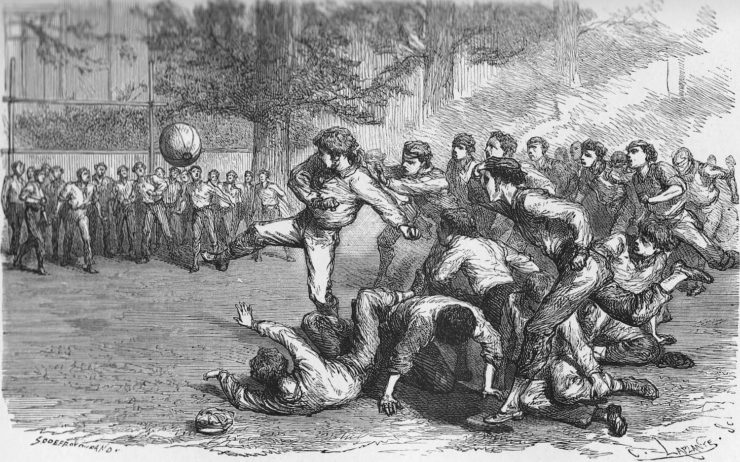
I was expecting Harry Potter to be the prime example here, but I guess it’s a bit too obvious. I did actually go to a boarding school (as a dayboy, which meant I got to spend half my time in the real world), ad I have to admit that Rowling got many little details correct.
The Magicians by Lev Grossman takes place at a boarding school, although it’s closer to college in age (it’s also deliberately riffing on the Potter books).
Anathem by Neal Stephenson isn’t set in a boarding school, but there’s aspects of it at the start of the book (the discipline etc.)
Thinking of titles is harder than I thought.
Well I think we have to exclude military style training institutions because that is another genre. A continuation of the 20th century boys adventures set on sailing and training ships. So Stand by for Mars and all the Polaris books are out. Ditto Heinlein. Ditto Starfleet academy. (I know they claim not to be military but you could have fooled me. Uniforms – tick. Shouting orders – tick. Military ranks – tick)
Alexie Panshin’s protagonists like Antony Villiers were the product of boarding school. That’s not quite what we want either.
Patrick Rothfus seems the most recent with a different magic academy. Professor X had a mutant boarding school.
But I cannot think of any scifi equivalent to Bunter, Chalet School or Mallory Towers.
A Wizard of Earthsea seems like a conspicuous omission.
It seems that Battle School in Card’s “Ender’s Game” certainly qualifies here, and an extreme one at that.
Never Let Me Go? I know some don’t consider it SF, but it’s at least SF-adjacent.
Sarah Rees-Brennan’s wonderful In Other Lands is set in a boarding school slash military camp for child soldiers. It’s also an argument for learning to solve problems with diplomacy rather than violence, since our main character, the exasperating and delightful Elliot, is a determined pacifist.
Here are some fantasies that are written more for kids than adults.
ARCANUM 101, Mercedes Lackey and Rosemary Edghill. Young adult contemporary fantasy. After Tomas Torres starts using his ability to conjure fire and throw it to make money for his family, he’s caught for arson, but he’s sent to a “special” boarding school instead of jail. Yes, it’s a school for mages and psychics to train them to use their gifts safely and correctly. VeVe Langenfeld is his student mentor. She’s also a talented battle mage who has been fighting monsters since she was a little girl. This novel is mainly an introduction to the school, Tomas’ discovery that real magic and monsters exist, and that he has considerably more to him than anyone can guess. A nice story but maybe a little low key for kids expecting lots of action. Boys should enjoy this story because of Tomas’ viewpoint and his interest in repairing cars.
AMANDA LESTER AND THE PINK SUGAR CONSPIRACY, Paula Berinstein. Juvenile mystery. Twelve-year-old Amanda Lester wants to be a film maker, but her parents drag her to England and put her in a boarding school for the young progeny of famous detectives who are real, not fictional, where they must learn how to solve crimes. Embarrassed at being related to Detective Lestrade, the idiot detective in the Sherlock Holmes’ stories, she’s determined to not make an idiot of herself and makes friends with her two roommates, as well as handsome Nick and weird Simon. Soon, they are trying to figure out what has happened to two missing teachers, why pink sugar is all over the place, and what caused a big explosion. Can they solve the case? A cute story with great characters and a decent plot. The worldbuilding has some holes, and the true identity of one of the characters was obvious, but I doubt most kids would notice.
THE WITCH SQUAD, MZ Andrews. “A Witch Squad Cozy Mystery.” Paranormal young adult mystery. Young witch Mercy, under duress, becomes a student at a school for witches. Somehow, her perky room mate and a few other girls gets past her prickly protections, and they become known as the Witch Squad. On their first day of class, they are taken to the murder scene of a normal local teenaged girl. Mercy sees her spirit, but their instructor won’t allow the girls to help investigate so they do so on their own. Disaster and danger ensues. Decently written with just a bit of a Harry Potter vibe. Mercy’s gradual change from a loner to a leader is enjoyable.
THE UNEXPECTED ENLIGHTENMENT OF RACHEL GRIFFIN, L. Jagi Lamplighter. Young young adult. Fantasy. Rachel Griffin enters the magical Roanoke Academy, finds new friends, and stumbles upon a magical conspiracy that threatens not only her friends and the school, but the entire world. Along with the usual tropes of the magical school, Lamplighter gives us a heroine with the best of Harry Potter, Ron, and Hermione, as well as an interesting world of magic and clues that the reader will pick up from our own world that the characters will not. An excellent read.
THE HOUND OF ROWAN, Henry H. Neff. Book 1 of “The Tapestry.” Young adult contemporary fantasy. Ten-year-old Max McDaniels sees something magical in a tapestry in a museum, and before you can say “Harry Potter,” he’s being attacked by monsters and sent to a small private school for young wizards where he must deal with the usual problems of school as well as various magical ones. Meanwhile, the school and Max himself have enemies circling. The book definitely has a Harry Potter as well as a Percy Jackson feel to it, but Neff creates a detailed history and magical beings which gives the story some originality, and Max is a good kid.
There’s practically an entire subgenre of assassin schools.
Nevernight is certainly a good guide!
Ashlynn’s method of surviving boarding school may be controversial, but it worked!
I don’t know if astronaut schools are in the genre, as the protagonists are more or less college age, but Connie Willis wrote an amusing story, D.A., about an unwilling recipient of a generally coveted studentship on an astronaut training orbital station.
Binti series starts as a “boarding college” adventure.
Unwillingly to Earth by Pauline Ashwell is an SF example – Lizzie (Lysistrata) Lee gets a scholarship to the Interplanetary College of Humanities from her backwater mining world.
Lackey’s “Arrows of the Queen” starts you off at a boarding school where the young heroine is fending off plots to both kill her and to drive her mad. Not a good way to start an education!
Arrows of the Queen actually starts off with the young hero being faced with the news that at age 13 she is old enough to be married off either to a man her father’s age as a junior wife or to a younger man as his Firstwife. And to be raped and have babies. Or she can choose lifelong silence and celibacy. Oh, and she has already been tortured by her older brother. Her boarding school was absolutely an improvement over where she starts off.
Pyramids may actually be my least favorite Discworld novel. It’s one of the last, maybe really the last, that depends more on broad parody than the rapier-like satire that characterized the rest of the series. John Clute even wrote in a review of Guards! Guards!, the next book, that it suffered from lacking the earlier books’ comedy. Clute may be the critic who I have the most respect for, but he was wrong there. Guards! Guards! is when the series started showing some real depth.
I love Christopher Brookmyre, but I’m WAY behind with him and haven’t read Pandaemonium yet.
Tom Brown’s Schooldays was OK, but it’s real claim to fame is that it gave the world (Harry) Flashman, who the great George MacDonald Fraser put to such great use.
Diana Wynne Jones, Witch Week.
How about Fledgling and Saltation by Sharon Lee and Steve Miller? The young protagonist is sent off planet to attend an elite flying school.
Is finishing school for young ladies close enough? Gail Carriger’s Etiquette & Espionage has the heroine offered a spot at Mademoiselle Geraldine’s Finishing Academy for Young Ladies of Quality, where young ladies can be taught the fine art of espionage, with a minor available in poisoning!
Yes — I was surprised the article didn’t mention Ender’s Game! All the elements mentioned are present. Thrilling narrative, check. (love the detailed battle games). Favoriting of student achievement over personal well-being, check. Cannot walk away from school, check! (on a space station). Villainous students, check.
Seanan McGuire’s “Wayward Children” series has Eleanor West’s Home for Wayward Children. I think that qualifies for the list.
Star Rebel by F. M. Busby is a good example, although military based. The Sarah and Nan books by Mercedes Lackey have characters that attend a boarding school, but the action rarely takes place there.
A Stranger to Command by Sherwood Smith. Precursor to her Crown Duel, and much the better of the two. Shevraeth is a stranger from across the continent, attending a kingdom military academy by invitation. The school doesn’t work as Shevraeth expected; but it works.
B0B@2: There is one Heinlein juvenile that’s on point: Red Planet, where the boarding school is a focus of the action.
I recall I really enjoyed SINGING THE DOGSTAR BLUES by Alison Goodman (1998). School, technology, extraterrestrials, weird genetic mysteries, and time travel. A fascinating mix. Some neat future Australian English slang, too.
There’s also A COLLEGE OF MAGICS by Caroline Stevermer (1994), which Jane Yolen later made a point of saying she’d liked much more than Harry Potter. There are definitely many more female characters around, and the magic is refreshingly elusive. The plot takes a while to heat up but then becomes a delightfully unpredictable romp with a sweet and intense romance, and the climax is a stunner.
@23: I also like A College of Magics, but most of the key action takes place after the lead leaves the school.
Similarly, my notes on The Poppy War say it starts with a martial-arts version of the usual boarding-school viciousness, but spreads into something like a magic-including rework of the Rape of Nanjing.
Carrie Vaughn’s Martians Abroad puts two colonist kids in a school in which Earth kids make social connections that enable them to run the world (as their parents retire?). I didn’t like it, but it seems to fit the definition.
Pretty sure James isn’t trying to be comprehensive. For one, he’s clearly avoiding the most popular exemplars, or he would have mentioned Nnedi Okorafor’s Binti stories.
Having worked in the private, non-boarding world school, but with teachers who worked there or whose spouses worked there, boredom was a common problem for students, leading to all sorts of behaviors not considered appropriate for adolescents and pre-adolescents, leading one local boarding school to receive the nickname “Coke [Redacted]-[Redacted]
Two more examples from me:
Jo Walton’s Among Others – not high fantasy, but hey, it did win a Hugo, so it counts.
Kim Newman’s The Secrets of Drearcliff Grange School where our heroine is sent after being found sleeping on the ceiling.
And a viev from the other side: in Stephanie Burgis’ Thornbound a female magician is trying to establish a magic school for women. It’s not easy, but not for the traditional reasons: in Angland after Boudicca with her mage-husband threw off Romans from the island 750+ years ago magic is reserved for men seen as the emotional sex, while practical women traditionally go into politics with the best ones being admitted into the rulling Boudiccate.
There are a bunch of these in YA books:
One of the originals is Princess Academy by Shannon Hale, which I had to read after losing a bet and found it was much better than expected about the power of women and sisterhood.
Christopher Nuttall writes bunches of these kinds of books, but the Zero Enigma ones are the ones I like best, about a girl who is special by not being special.
Sheri Thomas’ Elemental Trilogy is a “young woman disguising herself as a man to attend boarding school’ series that was good. And another like that is All men of Genius by Lev Rosen.
Ginn Hale wrote a boarding school fantasy mxm romance duology called Lord of the White Castle, where everyone is trying to kill him and his boyfriend.
Shadowspell Academy by KF Breene is about a kick-ass young woman who assembles a group of misfits into a close-knit team of friends in order to root out the corruption in the school.
The Bright Sparks YA books are about a team of young geniuses that attend a special boarding school on the moon, and the moon doesn’t have to try to kill them, it just comes naturally and they often have to solve the problems with science or die. Those are good for kids interested in science.